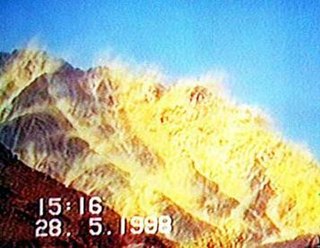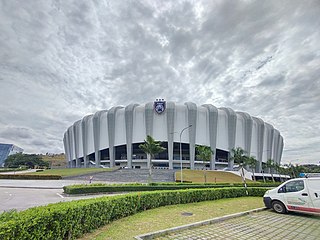Related Research Articles

The KL Monorail Line is one of the operational monorail systems in Malaysia. Operated as part of the RapidKL system by Rapid Rail, a subsidiary of Prasarana Malaysia, it is one of the components of the Klang Valley Integrated Transit System. The line is numbered 8 and coloured light green on official transit maps.

Abdul Qadeer Khan, NI, HI, FPAS, known as A. Q. Khan, was a Pakistani nuclear physicist and metallurgical engineer who is colloquially known as the "father of Pakistan's atomic weapons program".
Prasarana Malaysia Berhad (Prasarana) (English: Malaysian Infrastructure Limited) is a 100% government-owned company which was set up by Ministry of Finance (Malaysia) as a corporate body established under the Minister of Finance (Incorporation) Act 1957 to own the assets of multi-modal public transport operator in Malaysia, under the government's move to restructure the city's public transport system. It is one of the largest public-transport companies in Malaysia other than Konsortium Transnasional Berhad. As a government-owned company since 1998, it operates stage bus and light metro services via several wholly owned subsidiaries.

The Dr. A. Q. Khan Research Laboratories, or KRL for short, is a federally funded, multi-program national research institute and national laboratory site primarily dedicated to uranium enrichment, supercomputing and fluid mechanics. It is managed by the Ministry of Energy for the Government of Pakistan via partnership between the universities through the security contractor Strategic Plans Division Force due to its sensitivity. The site is located in Kahuta, a short distance north-east of Rawalpindi, Punjab, Pakistan.

This article lists important figures and events in Malaysian public affairs during the year 1998, together with births and deaths of notable Malaysians. Malaysia hosted the XVI Commonwealth Games in Kuala Lumpur between 11 and 21 September.

This article lists important figures and events in Malaysian public affairs during the year 2002, together with births and deaths of notable Malaysians.
This article lists important figures and events in Malaysian public affairs during the year 1989, together with births and deaths of notable Malaysians.
This article lists important figures and events in Malaysian public affairs during the year 1992, together with births and deaths of notable Malaysians.

Mitutoyo Corporation is a Japanese multinational corporation specializing in measuring instruments and metrological technology, headquartered at Takatsu-ku, Kawasaki, Kanagawa.

Friedrich Tinner, also known as Fred Tinner, was a Swiss nuclear engineer and a long-associated friend of Abdul Qadeer Khan—Pakistan's former top scientist—and connected with the Khan nuclear network trafficking in the proliferation of nuclear materials and gas centrifuge designs to Iran, Libya, and North Korea. In 2006, Tinner was revealed by the IAEA's investigators as the foreign director and technical head of the Libyan nuclear program. In Libya, Tinner ran the illicit nuclear experiments, using the expertise and technical information he received from his friend Khan, on behalf of the Libyan nuclear program. According to Khan, Tinner was the former researcher of the Kahuta Research Laboratories during the 1970s, when he worked there as a research scientist under the supervision of A. Q. Khan. Tinner is known and has been connected in particular with gas centrifuge technology used for isotopic enrichment of uranium.

Diana Danielle Danny Beeson, is an American-born Malaysian actress and singer. Starting her career at the age of 11, she primarily worked on television and film.

i-City is a 72 acres (29 ha) ICT-based urban development beside the Federal Highway in Section 7, Shah Alam, Selangor, Malaysia. Planned by architect Jon A. Jerde, i-City was designed as a fully integrated intelligent city, comprising corporate, leisure and residential components such as a one-million-square-foot regional shopping mall, office towers, Cybercentre office suites, hotels, apartments, data centers, and an innovation center.

Project-706, also known as Project-786 was the codename of a research and development program to develop Pakistan's first nuclear weapons. The program was initiated by Prime Minister Zulfiqar Ali Bhutto in 1974 in response to the Indian nuclear tests conducted in May 1974. During the course of this program, Pakistani nuclear scientists and engineers developed the requisite nuclear infrastructure and gained expertise in the extraction, refining, processing and handling of fissile material with the ultimate goal of designing a nuclear device. These objectives were achieved by the early 1980s with the first successful cold test of a Pakistani nuclear device in 1983. The two institutions responsible for the execution of the program were the Pakistan Atomic Energy Commission and the Kahuta Research Laboratories, led by Munir Ahmed Khan and Abdul Qadeer Khan respectively. In 1976 an organization called Special Development Works (SDW) was created within the Pakistan Army, directly under the Chief of the Army Staff (Pakistan) (COAS). This organization worked closely with PAEC and KRL to secretly prepare the nuclear test sites in Baluchistan and other required civil infrastructure.

Scomi Group Berhad is a global service provider that is based in Selangor, Sabah, Malaysia and is mainly involved in oil & gas, transport engineering and marine transportation.
Volvo Car Manufacturing Malaysia Sdn. Bhd. (VCMM) is a wholly owned subsidiary of Sweden-based Volvo Car Corporation. The company was established in September 1966 through a joint venture between AB Volvo and the Federal Auto Company Sdn. Bhd..
Tan Sri Dato' Sri (Dr.) Mohamad Norza Zakaria is a Malaysian chartered accountant and a fellow of CPA Australia. He is currently the President of Olympic Council of Malaysia (OCM) and also holds the post of President of Commonwealth Games Association of Malaysia.

The Libyan disarmament issue was peacefully resolved in December 2003 when Libyan leader Muammar Gaddafi agreed to eliminate his country's weapons of mass destruction program, including a decades-old nuclear weapons program. Mohamed ElBaradei, head of the International Atomic Energy Agency, said Libya's nuclear program was "in the very initial stages of development" at the time.

The Sultan Abdul Halim Muadzam Shah Bridge, also known as the Penang Second Bridge is a dual carriageway toll bridge in Penang, Malaysia. It connects Bandar Cassia in Seberang Perai on mainland Peninsular Malaysia with Batu Maung on Penang Island. It is the second bridge to link the island to the mainland after the first Penang Bridge.

Mohd Rafizi bin Ramli is a Malaysian politician who has served as the Minister of Economy in the Pakatan Harapan (PH) administration under Prime Minister Anwar Ibrahim since December 2022 and the Member of Parliament (MP) for Pandan from May 2013 to May 2018 and again since November 2022. He is a member of the People's Justice Party (PKR), a component party of presently the PH and formerly the Pakatan Rakyat (PR) coalitions. He has also served as the 5th Deputy President of PKR since July 2022. He served as Vice-President of PKR from August 2014 to July 2022, Secretary-General of PKR from October 2014 to November 2016 and Strategic Director of PKR from December 2010 to October 2014. He is the founder of both the whistleblower organisation, National Oversight and Whistleblowers Centre (NOW) and the election volunteerism organisation, Invoke Malaysia (INVOKE).

The Sultan Ibrahim Stadium is a football stadium in Iskandar Puteri, Johor, Malaysia. It is named in honor of the state's current ruler, Sultan Ibrahim ibni Almarhum Sultan Iskandar.
References
- ↑ Bonner, Raymond (5 February 2004). "NY Times article". Malaysia; Libya: NY Times article. Archived from the original on 18 June 2013. Retrieved 8 August 2010.
- 1 2 "US State Department release". State.gov. 12 January 2009. Retrieved 8 August 2010.
- ↑ http://www.btimes.com.my/Current_News/BTIMES/articles/20110719234710/Article/ [ dead link ]
- ↑ Report by Malaysian Police
- ↑ "Location of SCOPE factory". Streetdirectory.com.my. Retrieved 8 August 2010.
- ↑ "Malaysia Today article". Malaysia Today article. 21 July 2010. Archived from the original on 24 July 2010. Retrieved 8 August 2010.
- ↑ "Nuclear scandal: Man 'confesses'. 20 Feb., 2004". Edition.cnn.com. 20 February 2004. Retrieved 8 August 2010.
- ↑ "Malaysia Today article". Malaysia Today article. 16 July 2010. Retrieved 8 August 2010.
- ↑ "Malaysia Today article". Malaysia Today article. 23 July 2010. Retrieved 8 August 2010.
- ↑ "Straits Times article". News.asiaone.com. 4 March 2010. Archived from the original on 9 March 2010. Retrieved 8 August 2010.
- ↑ "5 Japanese arrested in atom case - Asia - Pacific - International Herald Tribune (Published 2006)". The New York Times . Archived from the original on 30 May 2023.
- ↑ Video of NHK News Bulletin Item
- ↑ "Straits Times article". Straits Times article. 16 January 2009. Archived from the original on 11 November 2010. Retrieved 8 August 2010.
- ↑ "DAP statement". Limkitsiang.com. 5 February 2004. Retrieved 8 August 2010.
- ↑ "Bernama article". Accessmylibrary.com. 16 January 2009. Retrieved 8 August 2010.
- ↑ "Financial Times article". Zawya.com. Archived from the original on 31 January 2016. Retrieved 8 August 2010.
- ↑ "Weapons export arrest made in New York". The Associated Press. 20 July 2007. Retrieved 20 July 2007.